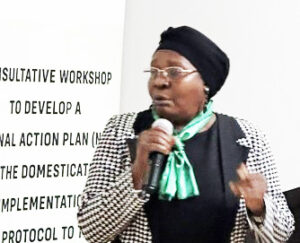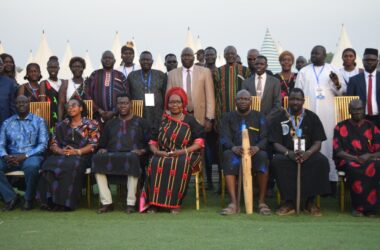
By Lodu William Odiya
The Undersecretary at the Ministry of Gender, Child and Social Welfare, Esther Ikere has on Wednesday said the ministry would develop a concrete action plan to guide in the implementation of Maputo Protocol.
Ikere made the remark in an official opening of a first consultative workshop to develop a national action plan for the domestication and implementation of the protocol in Juba.
“As we were not able to put our action plan in place, we are looking forward that by the end of this year we have a concrete action plan which will guide discussions nationally, which will be a road map that will be able to guide South Sudan on the reporting process” she said.
She stated that in pursuant to Article 26 of the African Charter on Human and People’s Rights of the Maputo Protocol and also pursuant to Article 62 of the African Charter, the state party is expected to report on the implementation of the Maputo Protocol.
She further added that despite the fact that many organizations have been doing a lot of implementations formally, they had not gone back again to do consultation.
Ikere underscored several advocacies were done by the government including Maputo protocol which advocates for the women rights.
“Everybody is aware about Maputo Protocol. I want to thank civil society in a special way, the robust advocacy has given a lot of awareness, and it has also given the momentum for the ratification process” she emphasized.
Meanwhile, Lutheran World Federation’s project coordinator for advocacy of human rights, Pauline Tikiba, urged all stakeholders to co-operate with the ministry of Gender, Child and social welfare to ensure implementation of the Maputo protocol.
“Let us not leave the Ministry alone. We have a complementary role to play when it comes to implementing the Protocol. Let us work hand in hand” she said.
“When we are writing our proposals in our offices, let us incorporate some of this into our activities, so that we move together in terms of implementation of this Protocol” Tikiba added.
She further emphasized stakeholders to take note in monitoring the implementation to ensure a concrete report which would be submitted to the African Union.
The Maputo Protocol, officially the Protocol to the African Charter on Human and Peoples’ Rights on the Rights of Women in Africa, is a comprehensive human rights treaty adopted by the African Union (AU) in 2003.
It aims to guarantee and promote the full range of women’s rights across the African continent which is considered one of the most progressive legal instruments for women’s rights, going beyond existing international human rights law by addressing specific issues relevant to African women.



